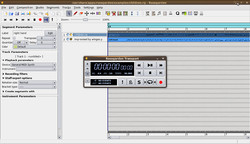Rosegarden: Difference between revisions
No edit summary |
No edit summary |
||
| Line 18: | Line 18: | ||
'''Rosegarden''' is a [[free software]] [[digital audio workstation]] program developed for [[Linux]] with [[Advanced Linux Sound Architecture|ALSA]] and [[Qt (framework)|QT4]]. It acts as an [[sound recording|audio]] and [[Musical Instrument Digital Interface|MIDI]] [[music sequencer|sequencer]], [[scorewriter]] and [[musical composition]] and editing tool. It is intended to be a free alternative to such applications as [[Cubase]]. |
'''Rosegarden''' is a [[free software]] [[digital audio workstation]] program developed for [[Linux]] with [[Advanced Linux Sound Architecture|ALSA]] and [[Qt (framework)|QT4]]. It acts as an [[sound recording|audio]] and [[Musical Instrument Digital Interface|MIDI]] [[music sequencer|sequencer]], [[scorewriter]] and [[musical composition]] and editing tool. It is intended to be a free alternative to such applications as [[Cubase]]. |
||
[[Software synthesizer]] is |
[[Software synthesizer]] is available as a plugin, and it is possible to use external MIDI synthesizer, hardware or software (such as [[FluidSynth]] or [[TiMidity|TiMidity++]]) in order to make any sound from MIDI compositions. Recent versions of Rosegarden support the [[DSSI]] software synthesizer plugin interface, and can use some Windows [[Virtual Studio Technology|VST]] plugins through an adapter. |
||
The current Rosegarden program was originally named Rosegarden-4, to distinguish it from a previous program by the same authors called Rosegarden 2.1, which is now known as X11 Rosegarden. X11 Rosegarden is very limited, but is stable on a wide variety of [[Unix-like]] operating systems and other platforms such as [[OpenVMS]]. In contrast, because Rosegarden(-4) uses the Linux ALSA system, it only runs in a very limited manner on non-Linux systems [http://rosegarden.sourceforge.net/tutorial/en/chapter-1.html]. |
The current Rosegarden program was originally named Rosegarden-4, to distinguish it from a previous program by the same authors called Rosegarden 2.1, which is now known as X11 Rosegarden. X11 Rosegarden is very limited, but is stable on a wide variety of [[Unix-like]] operating systems and other platforms such as [[OpenVMS]]. In contrast, because Rosegarden(-4) uses the Linux ALSA system, it only runs in a very limited manner on non-Linux systems [http://rosegarden.sourceforge.net/tutorial/en/chapter-1.html]. |
||
Revision as of 08:53, 8 July 2010
This article needs additional citations for verification. (November 2009) |
 Rosegarden 1.7.0 screenshot | |
| Developer(s) | Chris Cannam, Richard Bown, Guillaume Laurent, et al. |
|---|---|
| Repository | |
| Written in | C++ |
| Operating system | Linux |
| Type | Digital Audio Workstation |
| License | GNU General Public License |
| Website | www.rosegardenmusic.com |
Rosegarden is a free software digital audio workstation program developed for Linux with ALSA and QT4. It acts as an audio and MIDI sequencer, scorewriter and musical composition and editing tool. It is intended to be a free alternative to such applications as Cubase.
Software synthesizer is available as a plugin, and it is possible to use external MIDI synthesizer, hardware or software (such as FluidSynth or TiMidity++) in order to make any sound from MIDI compositions. Recent versions of Rosegarden support the DSSI software synthesizer plugin interface, and can use some Windows VST plugins through an adapter.
The current Rosegarden program was originally named Rosegarden-4, to distinguish it from a previous program by the same authors called Rosegarden 2.1, which is now known as X11 Rosegarden. X11 Rosegarden is very limited, but is stable on a wide variety of Unix-like operating systems and other platforms such as OpenVMS. In contrast, because Rosegarden(-4) uses the Linux ALSA system, it only runs in a very limited manner on non-Linux systems [1].
The Rosegarden project was started in 1993 at the University of Bath. Rosegarden 2.1 (X11 Rosegarden) was released under the GPL in 1997; Rosegarden(-4) began in April 2000. Version 1.0 was released on February 14, 2005, and version 1.2.4 on July 14, 2006. The current release is 10.02, which was released on February 14, 2010.
Rosegarden was developed up through 1.0 by Chris Cannam, Richard Bown and Guillaume Laurent. Since then, each release has been developed by a different mix of core and contributing project members, including, but not limited to D. Michael McIntyre, Pedro Lopez-Cabanillas, and Heikki Junes. Bown has retired from the project, while Laurent has left to pursue his interest in porting to Mac OS X via Cocoa in an as yet unnamed spinoff project.
Features
- MIDI and audio playback and recording with ALSA and JACK
- Piano-roll, score, event list and track overview editors
- DSSI synth and audio effects plugin support, including Windows VST effects and instrument support via dssi-vst
- LADSPA audio effects plugin support
- JACK transport support for synchronisation with other software
- Ability to build and run without JACK, for MIDI-only use
- Score interpretation of performance MIDI data
- Shareable device (.rgd) files to ease MIDI portability
- Triggered segments for pattern sequencing & performable ornaments
- Audio and MIDI mixers
- MIDI and Hydrogen file import
- MIDI, Csound, LilyPond and MusicXML file export (including PostScript and PDF output file generation of score)
- User interface translations for Russian, Spanish, German, French, Welsh, Italian, Swedish, Estonian, Japanese, Simplified Chinese, Dutch, Polish, Czech, Catalan, and Finnish, as well as UK and US English
- Help documentation available substantially or entirely translated into German, Swedish and Japanese as well as English
See also
External links
- Rosegarden home page
- Rosegarden download page (Sourceforge.net)
- Rosegarden user/dev forum - search or post questions here.
- Rosegarden Development Wiki - Official Development Site
